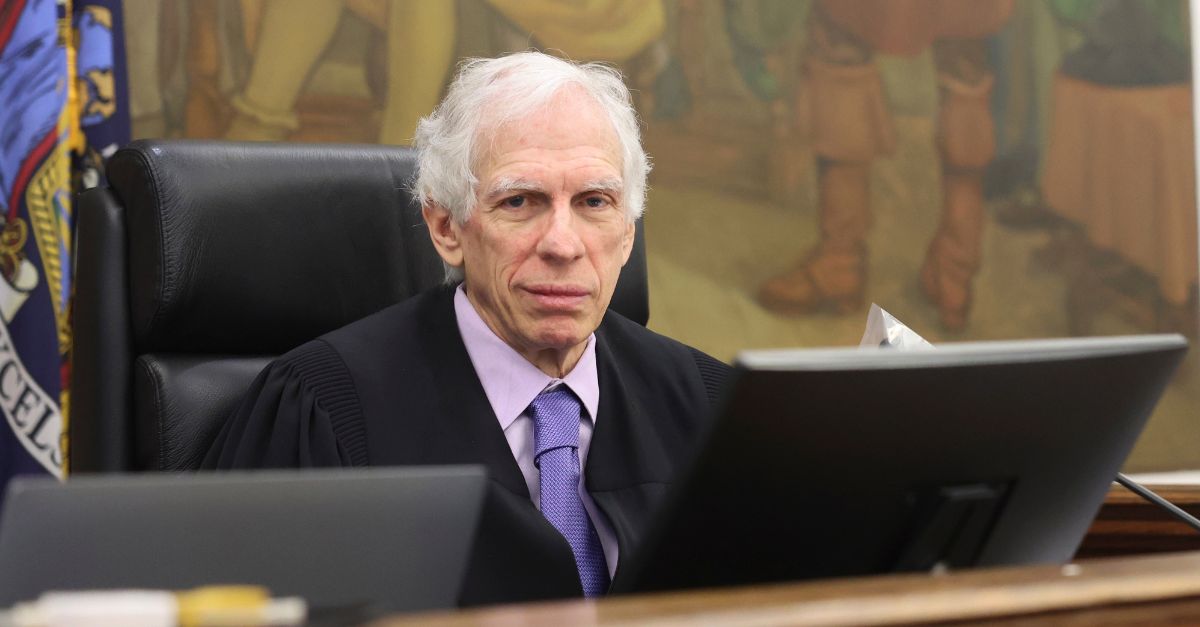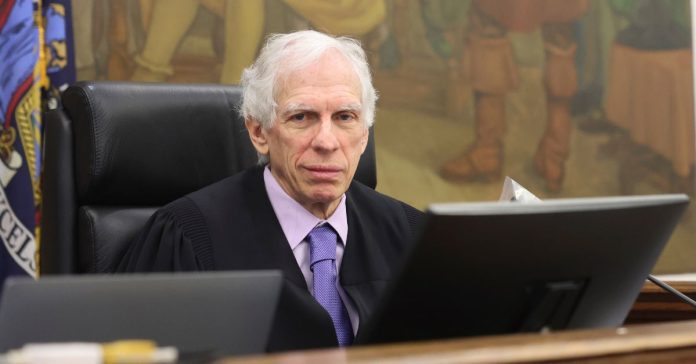
Judge Arthur Engoron presides over former President Donald Trump’s civil business fraud trial at New York Supreme Court, Wednesday, Oct. 25, 2023, in New York. (Spencer Platt/Pool Photo via AP)
The judge overseeing the Trump Organization civil fraud case slammed defense lawyers for suggesting bias when he made a “straightforward, narrow request for information” about possible perjury by Allen Weisselberg, a co-defendant.
According to a Thursday email in “People v. Trump, et al,” New York State Supreme Court Justice Arthur Engoron said that the antics from Trump’s legal team are “getting old” after a lawyer for Trump’s sons called his request for information “unprecedented, inappropriate and troubling,” after a New York Times article was published they said “speculates about purported plea negotiations involving Mr. Weisselberg and
the New York County District Attorney’s Office regarding unspecified allegations of perjury.”
“The article simply does not provide any principled basis for the Court to reopen the record or question the veracity of Mr. Weisselberg’s testimony in this case,” Clifford S. Robert wrote. “Indeed, we respectfully submit that the Court’s request for comment on this speculative media account is unprecedented, inappropriate and troubling.”
Weisselberg’s lawyer in the civil case, Alina Habba, said in court documents the information in the article is “neither admissible nor reliable.”
“It is respectfully submitted that the inadmissible and unsubstantiated New York Times article should not influence Your Honor’s perception of Mr. Weisselberg’s credibility as a witness or otherwise affect the ultimate outcome of this case, nor should it be the subject of further inquiry by this Court,” she added. “We urge you to render your decision based solely on the evidence now before you.”
Engoron said that when he requested the information, he “was not seeking to initiate a wide-ranging debate with counsel and felt compelled to respond” over “your misleading response” that “grossly mischaracterizes the letter that I wrote.”
“Arguing against judicial notice is attacking a straw person, as I have not taken, do not plan to take, and did not suggest or hint that I would take judicial notice of the subject New York Times article or the contents thereof,” Engoron wrote. “Similarly, I have not taken, do not plan to take, and did not suggest or hint that I would take the Times article into consideration in my findings of fact.”
“Similarly, I have not planned, do not plan, and did not suggest or hint that I would invoke falsus in uno based on the story,” he added. “Any such invocation would be based on his trial testimony and/or a guilty plea.”
He said that if Weisselberg publicly confesses to having committed perjury about a significant matter in the case or pleads guilty to perjury before he issues his final decision, “I will research and consider what the law allows.”
“I take seriously my obligation to find the facts and determine the truth,” the judge added. “To that end, I find it appropriate to have reached out to counsel for Mr. Weisselberg, who is a defendant in this case, to inquire as to her knowledge of this serious allegation.”
The judge cited model rules of attorney behavior: “Indeed, Rule 3.3(a)(3) provides that ‘If a … lawyer’s client … offered material evidence and the lawyer comes to know of its falsity, the lawyer shall take reasonable remedial measures, including, if necessary, disclosure to the tribunal.’”
“You and your co-counsel have been questioning my impartiality since the early days of this case, presumably because I sometimes rule against your clients. That whole approach is getting old,” he added.
As Law&Crime reported last month, the judge ordered Trump to fork over nearly $400,000 in legal fees underpinning a now-dismissed lawsuit he brought against a newspaper and a trio of its reporters when they published a bombshell series of reports on his history of tax schemes and “riches” reaped from his father.
The order was first reported by Times reporter Susanne Craig, one of the report’s authors. Per the order, fees are also due to reporters David Barstow and Russ Buettner.
The claim from Trump was dismissed by a New York Supreme Court judge last May, who found that reporters were “entitled to engage in legal and ordinary news-gathering activities without fear or tort liability — as their actions are at the very core of protected First Amendment activity.”
In an email, Danielle Rhoades Ha, the senior vice president for external communications at the Times, said the judge’s decision “shows that the state’s newly amended anti-SLAPP statute can be a powerful force for protecting press freedom.”
“The court has sent a message to those who want to misuse the judicial system to try to silence journalists,” Ha added.
Trump first filed the lawsuit against his niece, Mary Trump, the paper and its reporters in 2021, arguing an “insidious plot” was underway to blast his private tax returns improperly into the public sphere.
Trump accused Craig, Barstow and Buettner of somehow “smuggling” records out of the grips of Mary Trump’s lawyer to mount their investigation into his tax records.
The in-depth, deeply sourced report won a Pulitzer Prize and exposed a massive empire “riddled with tax dodges,” award judges said at the time.
The decision notably arrives as Trump’s civil tax fraud trial concluded in New York a day before and amid outbursts from Trump that sounded familiar to those he lobbed against the Times.
It is now in the hands of Engoron to decide whether he will impose a fine of $370 million on Trump for what the state’s attorney general, Letitia James, has claimed is a long pattern of fraud perpetrated by him and his top executives on the New York real estate industry.
If James has her way, Engoron will also ban Trump from life from ever dabbling in New York real estate ventures again.
Law&Crime’s Brandi Buchman contributed to this report.
Have a tip we should know? [email protected]

